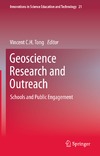From energy and water resources to natural disasters, and from changing climatic patterns to the evolution of the Earth’s deep interior, geoscience research affects people’s lives in many ways and on many levels. This book offers a stimulating cross-disciplinary perspective on the important relationship between geoscience research and outreach activities for schools and for the general public.
The contributors – academics, research scientists, science educators and outreach program educators – describe and evaluate outreach programs from around the world. A section entitled Field-based Approaches includes a chapter describing an initiative to engage Alaskan communities and students in research, and another on problem-based learning in the field setting. The Online Approaches section discusses ways to connect students and scientists using online forums; use of the web and social media, including the United Nations University and its experience with the design of a web magazine featuring geoscience research; and video clips on marine geoscience created by students and scientists. The section on Workshop and Laboratory-based Approaches includes a chapter on teaching geochronology to high school students, and another describing an extracurricular school activity program on meteorology. The Program Design section presents chapters on Integrating Geoscience Research in Primary and Secondary Education, on ways to bridge research with science education at the high school level, and on use of online geoscience data from the Great Lakes. The concluding section, Promoting Research-enhanced Outreach, offers chapters on Geoscience Outreach Education with the local community by a leading research-intensive university, and on the use of research to promote action in Earth science professional development for schoolteachers.Geoscience Research and Outreach: Schools and Public Engagement will benefit geoscience researchers who wish to promote their work beyond academia. It offers guidance to those seeking research funding from agencies, which increasingly request detailed plans for outreach activities in research proposals. Policymakers, educators and scientists working in museums, learned societies and public organizations who wish to widen participation will also find this book useful.
Together with the companion volume Geoscience Research and Education: Teaching at Universities, this book showcases the key role that geoscience research plays in a wide spectrum of educational settings.
 |
|
О проекте
|
|
О проекте


